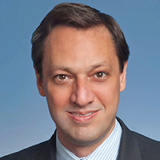
Tobias Adrian is a senior vice president at the Federal Reserve Bank of New York, where he serves as the associate research director for the Research and Statistics group and heads the Capital Markets Function. As a researcher, Adrian covers asset pricing, financial intermediation, and macroeconomics, with a particular focus on the aggregate implications of developments in capital markets. He contributes to the New York Fed's financial stability policy and to its monetary policy briefings. Adrian has taught at the Massachusetts Institute of Technology, New York University, and Princeton University. He holds an M.Sc. in econometrics and mathematical economics from the London School of Economics and a Ph.D. in economics from the Massachusetts Institute of Technology.
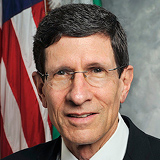
Richard B. Berner began a six-year term in January 2013 to serve as the first Director of the Office of Financial Research (OFR), part of the U.S. Department of the Treasury. The OFR aids the Financial Stability Oversight Council, its member agencies, and the public by improving the quality, transparency, and accessibility of financial data and information. It conducts and sponsors research related to financial stability, and promotes the use of best practices in risk management. Before Berner joined the Treasury in April 2011 to serve as Counselor to the Secretary of the Treasury, he worked at Morgan Stanley, where he was co-head of Global Economics. Berner has also worked at Mellon Bank, Salomon Brothers, Morgan Guaranty Trust Company, Wharton Econometrics, and the Federal Reserve Board. He received an A.B. from Harvard College and a Ph.D. in economics from the University of Pennsylvania.
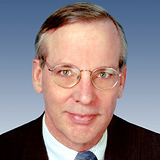
William C. Dudley became the tenth President and Chief Executive Officer of the Federal Reserve Bank of New York on January 27, 2009. He previously served as the executive vice president of the New York Fed's Market Group—which oversees domestic open market and foreign exchange trading operations and provides account services to foreign central banks—and managed the System Open Market Account for the FOMC. Prior to joining the Bank in 2007, Dudley was a partner and managing director at Goldman Sachs, and for a decade was the firm's chief U.S. economist. Before joining Goldman Sachs in 1986, Dudley was a vice president at the former Morgan Guaranty Trust Company, and an economist at the Federal Reserve Board from 1981 to 1983. In 2012, he was appointed chair of the Committee on the Global Financial System for the Bank of International Settlements (BIS), and from 2009 to 2012 he served as chair for the BIS's Committee on Payment and Settlement Systems. Dudley is the chair of the Economic Club of New York and is on the BIS's board of directors. He has a bachelor's degree from New College of Florida and a Ph.D. in economics from the University of California, Berkeley.
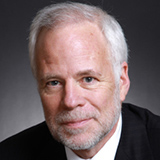
Barry Eichengreen is the George C. Pardee and Helen N. Pardee Professor of Economics and Political Science at the University of California, Berkeley, where he has taught since 1987. He is spending the 2014–2015 academic year as the Pitt Professor of American History and Institutions at the University of Cambridge. Eichengreen's scholarship broadly focuses on economic history and international economics, employing both historical and contemporary perspectives to analyze exchange rates, capital flows, and the European economy. He has also published studies on the gold standard and the Great Depression, European and Asian integration, China's impact on the international economic and financial system, and the International Monetary Fund's past, present, and future policies. Eichengreen is a research associate at the National Bureau of Economic Research, a research fellow at the Centre for Economic Policy Research, a fellow of the American Academy of Arts and Sciences, chairs the Academic Advisory Committee of the Peterson Institute of International Economics, and is the convener of the Bellagio Group of academics and economic officials. He is a regular monthly columnist for Project Syndicate and has written many books, most recently Hall of Mirrors: The Great Depression, The Great Recession, and the Uses—and Misuses—of History. Eichengreen has an A.B. from the University of California, Santa Cruz. At Yale University he earned an M.A. in history in addition to an M.A., an M. Phil., and a Ph.D. in economics.
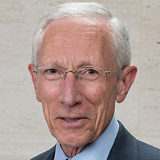
Stanley Fischer took office as a member of the Board of Governors of the Federal Reserve System on May 28, 2014, to fill an unexpired term ending on January 31, 2020. He was sworn in as Vice Chairman of the Board of Governors on June 16, 2014 for a four-year term that expires on June 12, 2018. Prior to being appointed to the Federal Reserve Board, Fischer was the Governor of the Bank of Israel from 2005 through 2013, and was vice chairman of Citigroup from February 2002 to April 2005. He served as the First Deputy Managing Director of the International Monetary Fund from September 1994 through August 2001, and was the World Bank's chief economist from January 1988 to August 1990. Fischer taught economics at the Massachusetts Institute of Technology from 1973 to 1999, and was an assistant professor of economics and a postdoctoral fellow at the University of Chicago from 1970 until 1973. As an academic and a policymaker, Fischer has published widely in the fields of macroeconomics, monetary economics, and international economics. He has been a research associate at the National Bureau of Economic Research, and a fellow at the American Academy of Arts and Sciences, the Econometric Society, and the Guggenheim Foundation, as well as an honorary fellow at the London School of Economics. Fischer received a B.Sc., an M.Sc. in economics from the London School of Economics, and a Ph.D. in economics from the Massachusetts Institute of Technology.
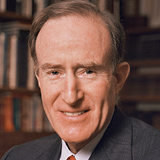
Benjamin M. Friedman is the William Joseph Maier Professor of Political Economy at Harvard University, and a former chair of its economics department. He has written extensively on economic policy, particularly on the role that financial markets play in shaping how monetary and fiscal policies affect overall economic activity. Friedman's academic work has specifically addressed the effects of government deficits and surpluses on interest rates, exchange rates, and business investment; appropriate guidelines for the conduct of U.S. monetary policy; and appropriate policy actions in response to crises in a country's banking or financial system. He has written two books aimed at a broader audience, The Moral Consequences of Economic Growth (2005) and Day of Reckoning: The Consequences of American Economic Policy Under Reagan and After (1988), which received Columbia University's George S. Eccles Prize for excellence in writing about economics. A research associate at the National Bureau of Economic Research, Friedman previously served as director of its programs on financial markets and monetary economics. He is also a member of the Council on Foreign Relations and the American Academy of Arts and Sciences. Friedman received the A.B., A.M., and Ph.D. degrees in economics from Harvard University, and holds an M.Sc. in economics and politics from King's College, Cambridge, where he studied as a Marshall Scholar.

Mark Gertler is the Henry and Lucy Moses Professor of Economics at New York University. He specializes in macroeconomic theory, monetary economics, and finance. At NYU, Gertler has served as the chair of the department of economics and as the director of the C.V. Starr Center for Applied Economics. Gertler currently serves as an academic advisor for the Federal Reserve Bank of New York and co-directs the National Bureau of Economic Research's program on Economic Fluctuations and Growth. He is a fellow of the Econometric Society, the Guggenheim Foundation, and the American Academy of Arts and Sciences. Gertler has also taught at Cornell University, the University of Wisconsin at Madison, Princeton University, and Columbia University. He earned a B.A. from the University of Wisconsin at Madison and a Ph.D. in economics from Stanford University.
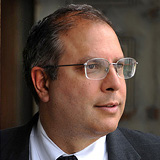
Anil K Kashyap is the Edward Eagle Brown Professor of Economics and Finance at the University of Chicago's Booth School of Business. His research focuses on banking, business cycles, financial regulation, and monetary policy. Kashyap serves as a consultant and advisor for the Federal Reserve Banks of Chicago and New York, the Congressional Budget Office, the cabinet office of the Japanese Prime Minister, the International Monetary Fund, and the Swedish Riksbank. He is a member of the board of directors for the Bank of Italy's Einuadi Institute of Economics and Finance. Before joining the University of Chicago in 1991, Kashyap spent three years as an economist at the Board of Governors of the Federal Reserve System. He earned a B.A. in economics and statistics from the University of California, Davis, and a Ph.D in economics from the Massachusetts Institute of Technology.
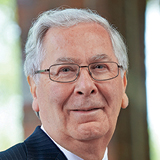
Sir Mervyn King joined New York University in September 2014 as a professor of economics and law, a joint appointment with the Stern School of Business and NYU's School of Law, after spending fall semester 2013 as a distinguished visiting professor at both schools. Since 2015, King also holds a position as the School Professor of Economics at the London School of Economics. From 2003 until June 2013, King served as the Governor of the Bank of England and Chairman of the Monetary Policy and the Financial Policy Committees. Previously, he had been the Bank of England's Deputy Governor from 1998 to 2003, its chief economist and executive director from 1991, and a non-executive director from 1990–1991 before joining the Bank in 1991. Prior to this, he had been an economics professor at the London School of Economics from 1984 through 1991, and founded its financial markets group. King previously taught at the University of Cambridge, the University of Birmingham, and has been a visiting professor at Harvard University and the Massachusetts Institute of Technology. He is a fellow of the British Academy and is a foreign honorary member of the American Academy of Arts and Sciences. King was knighted (GBE) in 2011, made a life peer in 2013, and appointed by The Queen to be a Knight of the Garter in 2014. He has a first-class degree in economics from King's College, Cambridge, has also studied at St. John's College, Cambridge, and was a Kennedy Scholar at Harvard University.
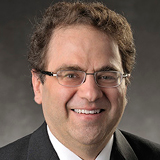
Narayana R. Kocherlakota is the President and Chief Executive Officer of the Federal Reserve Bank of Minneapolis. Before assuming his current post in October 2009, Kocherlakota served as a member of the Bank's research staff and as a research consultant to the Bank. From 1998 to 2002, he was a professor of economics at the University of Minnesota, and from 2002 to 2005 he was a professor of economics at Stanford University. In 2006 Kocherlakota returned to the University of Minnesota, where he served as chair of the economics department through 2008, and remained a professor there until 2010. As a scholar, his work has included both theoretical and empirical contributions to monetary and financial economics. Kocherlakota is a fellow of the Econometric Society and is on the board of directors of the Economic Club of Minnesota. He earned an A.B. in mathematics from Princeton University and a Ph.D. in economics from the University of Chicago.
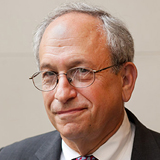
Donald Kohn is a senior fellow in the economic studies program at the Brookings Institution, where he focuses on monetary policy, financial regulation, and macroeconomics. Kohn serves on the Bank of England's Financial Policy Committee per appointment by the U.K. government. He also is on a number of committees that advise U.S. government agencies, including for the Office of Financial Research, the Federal Deposit Insurance Corporation, and the Congressional Budget Office. A forty-year veteran of the Federal Reserve System, Kohn served on the Board of Governors from 2002 to 2010, the last four years as Vice Chairman. While at the Fed, he also chaired the Committee on the Global Financial System, a central bank panel that monitors and examines broad issues related to financial markets and systems. Some of the other positions Kohn held during his career at the Federal Reserve Board include serving as Secretary of the Federal Open Market Committee (1987 to 2002), director of the Division of Monetary Affairs (1987 to 2001), associate director of the Division of Research and Statistics (1981 to 1983), and chief of the capital markets section (1978 to 1981). Kohn began his career as a financial economist at the Federal Reserve Bank of Kansas City before moving to the Board in 1975. He received a B.A. in economics from the College of Wooster and a Ph.D. in economics from the University of Michigan at Ann Arbor.
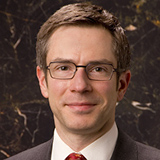
Randall S. Kroszner is the Norman R. Bobins Professor of Economics at the University of Chicago's Booth School of Business, where he has taught since 1990. His research interests include the regulation of financial institutions, international financial crises, the Great Depression, monetary economics, corporate governance, debt restructuring and bankruptcy, and political economy. He is currently a research associate at the National Bureau of Economic Research. From 2006 until 2009 Kroszner served on the Board of Governors of the Federal Reserve Board, where he chaired the committee on Supervision and Regulation of Banking and the committee on Consumer and Community Affairs. In these capacities he took a leading role in developing responses to the financial crisis and in undertaking new initiatives to improve consumer protection and disclosure, including rules related to home mortgages and credit cards. Kroszner represented the Federal Reserve Board on the Financial Stability Forum (now called the Financial Stability Board), the Basel Committee on Banking Supervision, and the Central Bank Governors of the American Continent, and was a director of NeighborWorks America. From 2001 to 2003, Kroszner was a member of the President's Council of Economic Advisers. Kroszner received a Sc.B. in applied mathematics-economics from Brown University and an M.A. and a Ph.D. in economics from Harvard University.
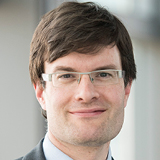
Luc Laeven is the Director General for Research at the European Central Bank, a post he assumed in early 2015. Prior to this, Laeven was the Lead Economist in the research department at the International Monetary Fund, which he joined in 2006 as a senior economist before being promoted to Deputy Division Chief in 2009 and to Lead Economist in 2012. He has also been the Chaired Professor of Finance at Tilburg University since April 2009. Laeven's economic research focuses on issues related to international banking and corporate finance. He is a research fellow at the Centre for Economic Policy Research and a research associate at the European Corporate Governance Institute. Before joining the International Monetary Fund, he was a senior financial economist in the Financial Sector Department at the World Bank and worked at ABN Amro Bank. Laeven has co-authored and co-edited four books: Systemic Risk, Crises, and Macroprudential Regulation; Systemic Financial Crises: Containment and Resolution; Deposit Insurance around the World: Issues of Design and Implementation, and A Reader in International Corporate Finance (two volumes). He has an M.Sc. in econometrics from Tilburg University, an M.A. in international finance from the University of Amsterdam, studied finance at the London School of Economics, and earned a Ph.D. in economics from the University of Amsterdam.

Nellie Liang has worked at the Federal Reserve Board since 1986. She currently serves as the Director of the Office of Financial Stability Policy and Research (OFS), which is responsible for conducting and coordinating the Board's work that is related to analyzing emerging and structural risks to financial stability and developing macroprudential policies to mitigate systemic risks. Liang's recent research has focused on fragilities in short-term funding markets, the effect of creditor rights on real economic activity, and the cost of equity capital and corporate payout policies. Her past positions at the Board have included working as an economist in the financial structure section, working as an economist in and then chief of the capital markets section, and serving as the assistant director of the division of Research and Statistics. Liang has a B.A. in economics from the University of Notre Dame, and an M.A. and a Ph.D. in economics from the University of Maryland, College Park.
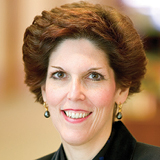
Loretta J. Mester became the President and Chief Executive Officer of the Federal Reserve Bank of Cleveland in June 2014. Prior to this, she was executive vice president and the director of research at the Federal Reserve Bank of Philadelphia, which she joined as an economist in 1985. Her areas of expertise include the organizational structure and productive efficiency of financial institutions, financial intermediation and regulation, agency problems in credit markets, credit card pricing, central bank governance, and inflation. Mester is an adjunct professor of finance at the University of Pennsylvania's Wharton School and a fellow at the Wharton Financial Institutions Center. She is a founding director of the Financial Intermediation Research Society, a member of the advisory board of the Financial Intermediation Network of European Studies (FINEST), a director of the Greater Cleveland Partnership, and a member of the Cleveland Clinic's Board of Trustees. Mester has a B.A. in mathematics and economics from Barnard College of Columbia University. She earned M.A. and Ph.D. degrees in economics from Princeton University, where she was a National Science Foundation Fellow.
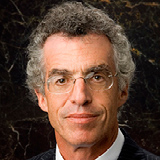
Frederic S. Mishkin is the Alfred Lerner Professor of Banking and Financial Institutions at Columbia University's Graduate School of Business. His research focuses on monetary and regulatory policy and how it affects financial markets and the aggregate economy. From September 2006 to August 2008 Mishkin served on the Board of Governors of the Federal Reserve Board. He was an associate economist with the Federal Open Market Committee from 1994 to 1997, when he served as executive vice president and director of research at the Federal Reserve Bank of New York. Mishkin is currently a research associate at the National Bureau of Economic Research, a member of the Squam Lake Working Group on Financial Reform, and the co-director of the U.S. Monetary Policy Forum. He has taught at the University of Chicago, Northwestern University, and Princeton University, and received an honorary professorship from the Peoples (Renmin) University of China. Mishkin has authored or coauthored more than twenty books, including Monetary Policy Strategy, The Next Great Globalization: How Disadvantaged Nations Can Harness Their Financial Systems to Get Rich, and Inflation Targeting: Lessons from the International Experience. He has been a consultant to the Board of Governors of the Federal Reserve System, the World Bank, the Inter-American Development Bank, and the International Monetary Fund, as well as to numerous central banks throughout the world. Mishkin received an S.B and a Ph.D. in economics from the Massachusetts Institute of Technology.
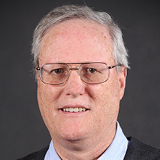
Joe Peek is a vice president and economist in the research department of the Federal Reserve Bank of Boston, where he heads the finance section. His current research interests are in financial stability, macroprudential regulation, international banking, Japanese banking problems, and monetary policy. Peek is also a research associate at Columbia University's Center on the Japanese Economy and Business, and in 2004–2005 was a fellow at the FDIC's Center for Financial Research. Before joining the Boston Fed in 2011, Peek held the Gatton Chair in International Banking and Financial Economics while based at the University of Kentucky's Gatton College of Business and Economics from 2000 through 2011. Peek began his academic career at Boston College, progressing from an instructor in 1978 to a full professorship in economics by 1989, and served as director of graduate studies from 1987 to 1990. He was a visiting scholar at the Boston Fed from 1985 through 2000. In the spring of 1992 and 1994, Peek served in a visiting capacity at the University of Canterbury in Christchurch, New Zealand. He earned a B.S. in mathematics and an M.S. in economics from Oklahoma State University, and a Ph.D. in economics from Northwestern University.
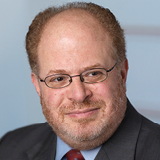
Adam S. Posen is president of the Peterson Institute for International Economics, which he joined in 1997 after working at the Federal Reserve Bank of New York. Posen brings a uniquely international perspective to macroeconomic policy, the resolution of financial crises, central banking issues, and the economies of Europe, Japan, and the United States. Posen worked in finance in Germany following the country's reunification; wrote the definitive book on Japan's economic crisis in the 1990s; and along with Ben Bernanke authored a reform program for Federal Reserve policymaking. From 2009 to 2012, Posen served as an external member of the Bank of England's Monetary Policy Committee. He is in his fifth term as an economic adviser to the U.S. Congressional Budget Office. Posen has served as a visiting fellow or consultant to over a dozen central banks in Europe and Asia. He is a member of the Council on Foreign Relations, the Trilateral Commission, and the faculty of the World Economic Forum. Posen received an A.B. in government from Harvard College and Ph.D. in political economy and government from Harvard University.
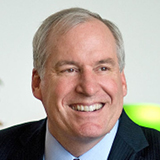
Eric S. Rosengren is the President and Chief Executive Officer of the Federal Reserve Bank of Boston, a post he assumed in July 2007. His economic research has focused on the link between financial problems and the real economy, and he has published extensively on macroeconomics, international banking, bank supervision, and risk management. Prior to his current position, Rosengren was a senior manager in the Bank's research department and in the division of bank supervision, regulation, and credit. He joined the Bank in 1985 as an economist in the research department, was promoted to assistant vice president in 1989 and to vice president in 1991, when he also became head of the department's banking and monetary policy section. In 2000 Rosengren was named senior vice president and head of the department of supervision, regulation, and credit, in 2003 was given the additional title of chief discount officer, and in 2005 was became an executive vice president. While in the bank supervision function, Rosengren was active in domestic and international regulatory policy. He serves as a director for United Way of Massachusetts Bay and Merrimack Valley, as a trustee for Colby College, and as a member of the advisory boards at Colby College and the University of Wisconsin. Rosengren earned a B.A. in economics from Colby College, and an M.S. and Ph.D. in economics from the University of Wisconsin at Madison.
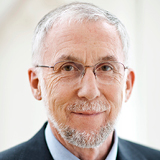
Lars E.O. Svensson is serving as a Resident Scholar in the research department at the International Monetary Fund during 2015. He has been a visiting professor at the Stockholm School of Economics since May 2013, and has been an affiliated professor at Stockholm University's Institute for International Economic Studies since June 2009. As a specialist in monetary economics, monetary policy, exchange-rate theory and policy, and general international macroeconomics, Svensson has published, lectured, and consulted extensively at many universities, central banks, and international organizations. Between May 2007 and May 2013, he was the Deputy Governor of Sveriges Riksbank. From 2001 to 2009 Svensson was a professor of economics at Princeton University, while from 1984 to 2003 he was a professor of international economics at Stockholm University's Institute for International Economic Studies. Svensson was a member of the committee for the Alfred Nobel Memorial Prize in Economic Sciences from 1988 to 2002, and served as its chair from 1999 to 2001. In 2012 he received the Great Gold Medal of the Royal Swedish Academy of Engineering Sciences. Among his many affiliations, highlights include being a foreign honorary member of the American Academy of Arts and Sciences, a fellow of the Econometric Society, a research associate of the National Bureau of Economic Research, and membership in Academia Europaea and the Royal Swedish Academy of Sciences. Svensson has a B.A. in economics from Stockholm University, an M.S. in mathematics from the Royal Institute of Technology (Stockholm), and a Ph.D. in economics from Stockholm University.
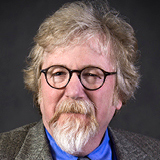
Geoffrey M.B. Tootell is a senior vice president at the Federal Reserve Bank of Boston, and serves as the director of its research department. In that capacity, he oversees the department's work, particularly the economic analysis it produces for the monetary policy deliberations conducted by President Rosengren and the Bank's Board of Directors. Tootell's own research focuses on monetary policy, with a special emphasis on the determinants of inflation and on how the FOMC arrives at its decisions. He has explored the role that asset prices might play in policymaking and whether the Federal Reserve's economic forecasts might be improved by incorporating bank supervisory information. Tootell's broader research interests encompass macroeconomics, international economics, and political economy. He has written and co-authored a number of influential articles on racial patterns in mortgage lending. Tootell joined the Bank as an economist in 1989, was promoted to assistant vice president and economist in 1993, and to vice president in 1998. He was promoted to senior vice president and deputy director of research in 2008 before becoming the research director in January 2011. Tootell has an A.B from Harvard College, where as an undergraduate he was a John Harvard Scholar, and earned his Ph.D. in economics from Harvard University.

Josef Tošovský has been Chairman of the Financial Stability Institute at the Bank for International Settlements since December 2000. He also serves as an associate professor at the University of Economics, Prague. In 1973, Tošovský began his career at the State Bank of Czechoslovakia, where he held a number of posts, culminating in his appointment as Governor of the State Bank of Czechoslovakia in 1989. Following the split of the Czech and Slovak Federal Republic and the establishment of the Czech National Bank, he was appointed its Governor in 1993. In response to the political crisis in the Czech Republic at the end of 1997, Tošovský was appointed Prime Minister of the Czech government. In July 1998, he was reappointed as Governor of the Czech National Bank, and stepped down from this position at the end of November 2000. Tošovský is a member of the International Council of the Bretton Woods Committee, a member of the board of the Financial Services Volunteer Corps, the recipient of several awards, and holds an honorary doctorate from Mendelova Universita Brno. Tošovský graduated from the University of Economics, Prague.
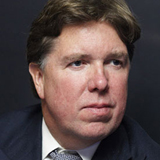
Sir Paul Tucker is a fellow at Harvard University's John F. Kennedy School of Government. From 2009 through October 2013, he was the Deputy Governor at the Bank of England, which he joined in 1980. Tucker was a member of all the Bank's statutory policy committees: the Monetary Policy Committee, vice chair of the Financial Policy Committee and of the Prudential Regulatory Authority Board, and the Court of Directors. In terms of international policymaking, Tucker was a member of the steering committee of the G-20 Financial Stability Board, and chaired its Committee on the Resolution of Cross-Border Banks, which sought to solve the problem of institutions deemed "too big to fail." He was also a member of the board of directors of the Bank for International Settlements, and was chair of the Basel Committee for Payments and Settlement Systems. Tucker is a visiting fellow of Nuffield College, Oxford, and a governor of the Ditchley Foundation. He has degrees in mathematics and philosophy from Trinity College, Cambridge.
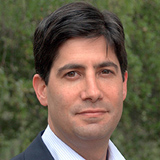
Kevin M. Warsh serves as a Distinguished Visiting Fellow at Stanford University's Hoover Institution and as a lecturer at the Stanford Graduate School of Business. He conducts extensive research in the field of economics and finance. Warsh recently issued an independent report recommending reforms in the United Kingdom's conduct of monetary policy, which the Bank of England has adopted. From 2006 until 2011 he served as a member of the Board of Governors of the Federal Reserve System. In this capacity, Warsh served as the Federal Reserve's representative to the G-20 and as the Board's emissary to the emerging and advanced economies in Asia. As the Administrative Governor, Warsh managed and oversaw the Board's operations, personnel, and financial performance. Before being appointed to the Board, Warsh served as Special Assistant to the President for Economic Policy and Executive Secretary of the White House National Economic Council from 2002 until 2006. Previously, Warsh had been a vice president and executive director at Morgan Stanley & Company in New York, where he was a member of the mergers & acquisitions department. Currently, Warsh is member of the Group of Thirty. He also advises several private and public companies, and serves on the board of directors for United Parcel Service. Warsh received his A.B. in public policy from Stanford University, and his J.D. from Harvard Law School.